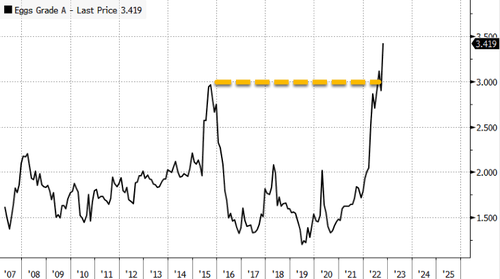
Egg supplies are tightening nationwide as more than 37 million egg-laying hens have died this year due to the severe bird flu outbreak, accounting for a whopping 10% of production. The result has been soaring egg prices at the supermarket ahead of the holiday season.
"Prices for eggs climbed more than 10% from September to October, according to the latest Consumer Price Index data. Prices in October were 43% higher than the same month a year ago. Eggs had the biggest jump by far on a monthly and yearly basis in any category in the US Department of Agriculture's food price outlook," Bloomberg reported.
Consumers paid an average of $3.42 for a dozen Grade A, large eggs last month -- up from $1.82 a year earlier.
Readers have been well-informed this year about the devastating bird flu outbreak ravaging commercial poultry farms nationwide.
"The recent spike is extraordinary in the shell-egg as well as egg-product markets," Bill Lapp, president of Advanced Economic Solutions, a consulting firm specializing in food economics, told CNBC.
Besides eggs, food inflation remained at the highest levels since the late 1970s, crushing the pocketbooks of Americans as they drain their savings and rack up credit card debt to buy essentials. Breakfast was the cheapest meal of the day but has since become expensive, thanks to soaring egg, bread, meat, and orange juice prices.
The last bird flu outbreak was in 2015. This current outbreak appears much worse in terms of just egg prices.
Egg supplies are tightening nationwide as more than 37 million egg-laying hens have died this year due to the severe bird flu outbreak, accounting for a whopping 10% of production. The result has been soaring egg prices at the supermarket ahead of the holiday season.
“Prices for eggs climbed more than 10% from September to October, according to the latest Consumer Price Index data. Prices in October were 43% higher than the same month a year ago. Eggs had the biggest jump by far on a monthly and yearly basis in any category in the US Department of Agriculture’s food price outlook,” Bloomberg reported.
Consumers paid an average of $3.42 for a dozen Grade A, large eggs last month — up from $1.82 a year earlier.
Readers have been well-informed this year about the devastating bird flu outbreak ravaging commercial poultry farms nationwide.
“The recent spike is extraordinary in the shell-egg as well as egg-product markets,” Bill Lapp, president of Advanced Economic Solutions, a consulting firm specializing in food economics, told CNBC.
Besides eggs, food inflation remained at the highest levels since the late 1970s, crushing the pocketbooks of Americans as they drain their savings and rack up credit card debt to buy essentials. Breakfast was the cheapest meal of the day but has since become expensive, thanks to soaring egg, bread, meat, and orange juice prices.
The last bird flu outbreak was in 2015. This current outbreak appears much worse in terms of just egg prices.








